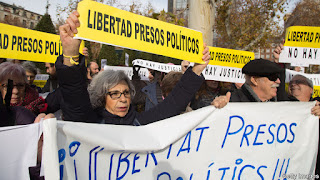For up to 15 months nine Catalan separatist leaders have been in jail. On February 4th they and three others are due to start what will be the first of many days in the Supreme Court as the oral phase of their trial on charges of rebellion and misuse of public funds gets under way. The charges, which could potentially result in sentences of up to 25 years in jail, arise from an unconstitutional referendum and illegal declaration of independence in one of Spain’s largest and richest regions in October 2017. For supporters of Catalan independence, it is a political trial. For many Spaniards it is retribution for a conspiracy to break up their country. It is also a test of the impartiality of the country’s judiciary.
The investigating judge, Pablo Llarena, contends that the defendants, most of whom were members of Catalonia’s regional government, pursued for several years a plan to achieve independence “whatever the cost”. He points to “violent episodes” in the final weeks of the campaign, especially a demonstration in which police and court officials searching a Catalan government office in Barcelona were barred from leaving for hours, while their vehicles were trashed.
In the aftermath of the referendum, which Spanish police tried but failed to prevent, Spain’s government imposed direct rule in Catalonia. It called a fresh regional election in which the separatists again won a narrow majority of seats, though with only 47.5% of the vote.
The referendum certainly took place in an atmosphere of intimidation. In approving laws to authorise the referendum and set up a new state, Catalonia’s parliament violated Spain’s constitution and its own statute of home rule. Quim Torra, the current Catalan president, recently urged Catalans to pursue “the Slovenian way” to independence, which involved a ten-day conflict and some 80 deaths. Yet many lawyers question whether all this amounts to sufficient violence to justify the charge of rebellion, designed for military coups.
It is an “unfair, irregular trial” in which the defendants’ rights have been violated, says Alfred Bosch, a member of the current Catalan government. He notes that courts in Germany, Scotland and Belgium granted bail to other defendants, including Carles Puigdemont, the former regional president, who fled abroad, before Mr Llarena dropped extradition proceedings. The Socialist government of Pedro Sánchez, which took office in June, is uncomfortable with the pre-trial detention of the defendants. But it insists that this is a judicial matter in which it cannot interfere.
The Catalan independence bid has unleashed a conservative reaction in the rest of Spain. In a regional election in Andalucia in December, Vox, a previously insignificant far-right party, won 11% of the vote. Vox is using a quirk in Spain’s legal system to join the state’s case against the separatists as a private party, which will allow it to cross-examine the defendants. This is a propaganda gift for the separatists, who claim, unfairly, that Spain’s judiciary is a holdover from Franco’s dictatorship.
Mr Sánchez hopes to defuse the Catalan conflict. He wants the separatist parties to vote for his budget, which includes a dollop of extra money for Catalonia. Some may do so: there are growing fissures within Catalan separatism, especially between Mr Puigdemont and Oriol Junqueras, his former deputy, who is the leading defendant but who does not back a further unilateral independence bid.
The trial will keep the divisive Catalan issue alive during European and regional elections in May. A verdict may not come until the autumn. If the defendants are found guilty, Spain’s politicians will have to decide whether to pardon them. That would be unpopular. But letting them moulder in jail will be seen abroad as a blot on Spain’s democracy.
This article appeared in the Europe section of the print edition under the headline "Justice in the dock"
https://www.economist.com/europe/2019/02/02/catalonias-separatist-leaders-go-on-trial








0 comentarios:
Post a Comment